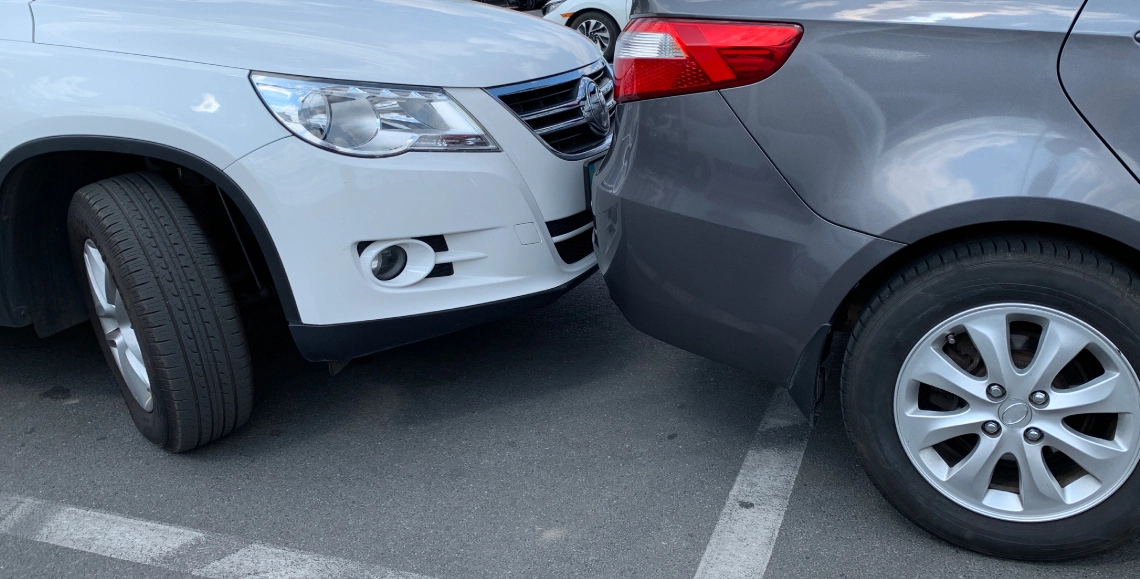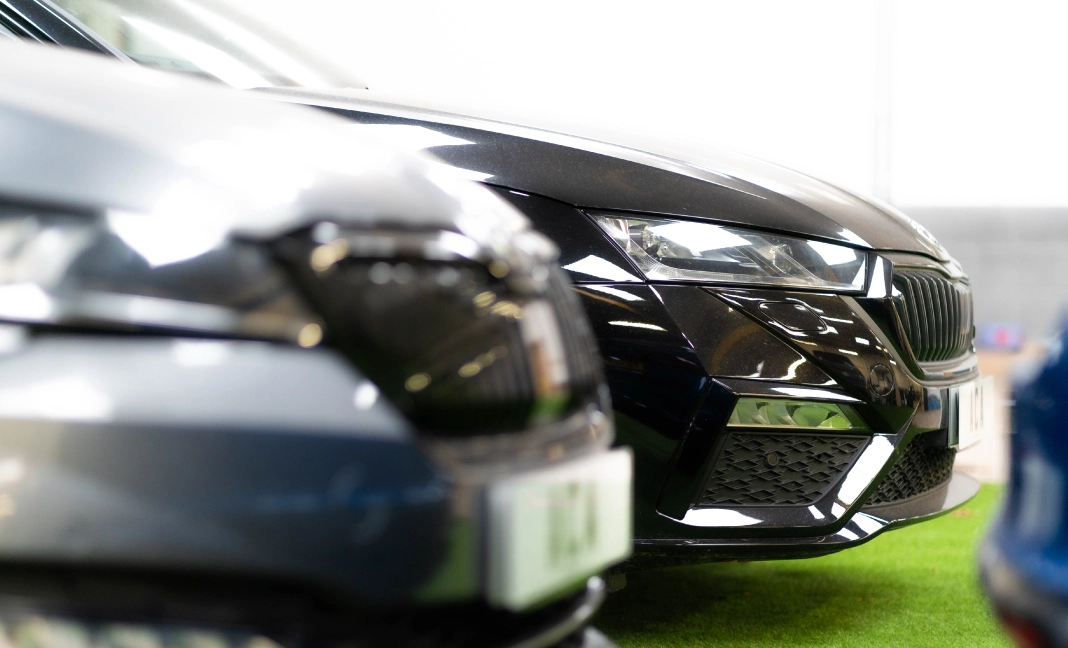Once everyone involved is safe and emergency services have been called to help with injuries and road clearance, ensure to thoroughly examine the scene to determine who’s at fault:
Consider the factors that caused the accident:
Evidence to consider includes:
Useful Tip:
Use a mixture of drawn diagrams, photographs and videos to collect evidence of the accident.
Below is an extensive guide on car park accidents and how to prove a car accident wasn’t your fault.
A lot of people search online for ‘car park accidents who’s at fault uk’.
A car park accident is when two or more cars collide in a car park.
Some examples of accidents that occur in a car park are:
To determine who is at fault for a car park accident, it’s important to fully understand the accident circumstances.


Was one of the cars in the accident stationary?
This might include:
If a car was stationary in a car park accident, a general rule of thumb would be that the other car is at fault. The other driver may bump, scrape or hit the stationary car while trying to park up or overtake.
This can happen because the driver may not be paying attention when they are parking up, or it can also happen if there is limited visibility due to other parked cars.
Did one car pull out from a bay while the other was passing?
When pulling out of a parking bay, the accident would usually be a side-impact collision. To determine fault when pulling out, however, the circumstances do matter, for example:
Typically, if the passing car was abiding by the road rules and didn’t cause a purposeful crash (Cash for crash scams), then a general rule of thumb would be that the car pulling out would be at fault for the accident.
This type of accident often occurs because the driver does not check for oncoming traffic before pulling out, or because they misjudge the speed of oncoming traffic.
In the UK, the law states that the driver of the moving vehicle, who hits the parked car, is responsible for the accident that occurs. In other words, if your car is parked legally in a car park space and another driver hits your car, they will be held liable for the damages.
Did the car in front suddenly stop and cause a rear-ended accident?
It’s not uncommon for cars to experience a lot of stopping and starting when navigating through a car park, especially if the car park is a large multi-story car park for example.
A car may suddenly stop in a car park for multiple reasons:
There are important factors which must be evidenced and considered in order to understand car park accidents and who’s at fault UK:
In a typical rear-ended accident, providing that the car in front did not intentionally or unnecessarily stop, it is the responsibility of the driver behind to adhere to stopping distances and pay attention. As a result, the rule of thumb is that the car behind, who rear-ended the car in front, would be at fault in the scenario.
The circumstances do matter when it comes to car park accidents and who’s at fault UK, though, and you must collect as much evidence as possible once the accident occurs.
Speak to a Non-Fault Claim Specialist
We manage everything on your behalf, ensuring that the claims process is as smooth and stress-free as possible.
Back to the top >

Have you been involved in a car park accident and you’re not sure who is at fault?
We have an experienced, non-fault expert team who can advise on your accident fault determination based on the circumstances.
Providing that the accident wasn’t your fault and you have collected all of the details we require, at no cost to you we can:
As we will process the claim directly through the other driver’s insurance company, and not through your own insurance policy, we will help you to:


Vehicles in car parks can be involved in a number of accidents, from scrapes and dents to more serious collisions.
There are a number of factors which can contribute to accidents in a car park, often associated with the driver’s abilities, conditions or driving behaviours.
We’ve broken down these behaviours & factors that contribute to car park accidents:
Reckless driving is a term used to describe a range of dangerous or negligent behaviours behind the wheel.
It can encompass:
Reckless driving is one of the leading causes of accidents and fatalities on our roads and car parks. It is taken very seriously by the law.
If someone is driving recklessly through or within a car park, they are more likely to cause an accident.
Reckless driving is not always easy to define. Generally speaking, it is considered a traffic violation if the driver’s actions create “a substantial and unjustifiable risk of harm to persons or property”.
There are many reasons why someone might drive recklessly through a car park. They may be trying to:
If someone has collided with your car in a car park from driving recklessly, it’s likely that you will be able to make a non-fault claim against them to cover the damages and losses.
Call our Non-fault New Accident Claims team now on 0330 128 1407 or click here to begin a non-fault accident claim.
Distracted driving is any activity that takes a driver’s attention away from the task of driving.
Distracted driving is dangerous because it reduces a driver’s reaction time and ability to focus on their surroundings. Distracted driving causes thousands of car accidents each year and results in hundreds of needless deaths.
Distracted driving is a serious problem that has only grown more prevalent over time with the increasing number of high-tech distractions available to us.
There are a number of reasons why someone might drive distracted through a car park.
Many people believe that they can multitask and safely handle several tasks at once. However, this is not the case when it comes to driving, especially in a car park. Even if you are only taking your eyes off the route for a few seconds to check your phone or take a drink, this is enough time for a serious accident to occur.
In the UK, our laws restrict the use of mobile phones while driving, but even these measures are not enough to prevent all distracted driving accidents.
Many people engage in other activities while driving that can be distracting, such as eating or putting on makeup. These types of distractions can also significantly reduce your reaction time and ability to focus on the road.
Some drivers may drive distracted in a car park because they feel rushed or pressured to get somewhere quickly.
However, it is important to remember that safety should always come first when behind the wheel.
All of these types of distractions are likely common issues when driving through a car park:
The pace of a car park is much slower than our standard roads, therefore people may believe that allowing that distraction is more acceptable as a result.
The reality couldn’t be further from the truth: Car parks can be busy, small, versatile places that need careful navigation and full alertness to the ever-changing route ahead.
Some tips for avoiding distractions while driving include:
Giving the right of way on the road means yielding to someone else who is legally allowed to go first at an intersection or in any other type of situation on the road.
When people are driving, they should always be aware of their surroundings and follow the laws and rules that keep everyone safe on the road.
It’s a critical and dangerous infraction to fail to yield when driving within any car park.
Any drivers and pedestrians with the right of way should be allowed to go ahead before a vehicle’s progression continues that doesn’t have the right of way. Ultimately, giving the right of way on the road is all about being responsible, courteous, and aware of what is happening.
There are a few possible reasons why someone might not give the right of way in a car park.
Whatever the reason, it’s important to remember that all car parks operate under the same set of rules, and it’s important that drivers receive their right of way.
Some car parks may also have designated lanes that drivers should follow when entering or exiting.
When using a multilane car park, it’s especially important that drivers respect these lanes and follow them closely. This not only helps to keep the traffic flowing smoothly but also helps to prevent accidents.
The right of way incidents are very common in car parks, especially when distraction or reckless driving is also a factor. It’s always best for drivers to proceed on the side of caution, giving way to the other driver.
Parking illegally in a car park generally means parking without a permit or parking in a space that is not designated for parking.
On a standard day, this might result in a parking fine or the driver’s car being towed, but sometimes it might cause a car accident.
Most people wouldn’t think of parking illegally as a serious issue, but it can lead to some dangerous accidents.
When drivers park in unauthorised areas, this often creates issues for other car park users.
Car parks often have narrow lanes and tight turns.
It doesn’t take much for an illegally parked vehicle to intercept the, what should be, correct flow of traffic.
Understanding fault when a collision occurs with an illegally parked car can be complex. The determination will be made from a detailed assessment of how the collision occurred.
If you have had a collision with an illegally parked car, ensure to collect as much detail as possible and be sure to draw a diagram of how the illegally parked car was the cause of the accident.
If the car park has poor lighting, poorly maintained surfaces and cars parked too close to each other, this can lead to accidents of vehicles.
Car accidents in car parks are most often caused by human error, but the car park itself might have contributing factors to the accident.
If the car park is poorly lit and this led to your accident, then the car park could be held liable. This is because the car park owner has a responsibility to maintain safe and well-lit conditions for people visiting the premises.
Another factor that can contribute to accidents in car parks is poorly maintained surfaces. If a car park has:
Then these conditions can lead to accidents.
Call us 0330 128 1407 | Start your claim now >
There can be a lot of confusion when it comes to who is at fault in a car park accident. As you can see above, there are many factors to take into consideration.
The first step is to collect evidence at the scene of the accident and undertake clear, calm communication with the other driver.
If you are involved in a car park accident and it wasn’t your fault, evidence is of vital importance to help determine who was at fault.
Following the accident it’s important you take notes about how the accident occurred including:
Collect any witness names and contact details. Your witness statement should cover the following questions:
Witness statements can be key to clarifying what happened and how it happened during your claim.
To give yourself the best chance at proving the accident wasn’t your fault, media such as photographs and videos help to show:
Additionally, if you can gain access to CCTV footage from the car park, this can be a valuable resource to help piece together what happened.
Not everyone knows exactly what to do after a car accident, especially if the accident wasn’t your fault.
The most important thing is to ensure everyone is safe. If there are any injuries, call the emergency services for help first before worrying about anything else.
It is imperative that you do not apologise or admit fault, no matter the circumstances. Admitting fault can seriously impact your claim for damages later on.
Once the situation is safe and calm, focus on collecting the details and evidence about the accident. This is important for processing a non-fault claim.
Auto Claims Assist
First contact after a car accident
Start my claim online Call us on 0330 128 1407Choosing Auto Claims Assist,
Your Trusted Claims Management Company
“Exceptional service throughout my claim. The communication from my case handler was superb. I would highly recommend Auto Claims Assist.”


15+
Years of expertise
1,000+
36,000+
Successful cases
Our team are ready to discuss the details of your accident and start your non-fault claim.
To getting started with Auto Claims Assist, simply call to us on 0330 128 1407 or start your claim online here.
To ensure trust, transparency and to exceed industry standards, we adhere to the standards set by the Financial Conduct Authority (FCA), The Credit Hire Organisation (CHO) and The General Terms Of Agreement (GTA).
We are:
Independent to insurers
On your side
Dedicated to delivering an award-winning, exceptional customer experience.
You can feel confident knowing that your claim is being handled professionally by experts.
We’re a UK leading Accident Management Company founded in 2009, helping thousands of people, throughout the country, every year after non-fault accidents. Our team of accident experts have over 15+ years of experience in the complexities of Accident Management and Credit Hire.
Don’t just take our word for it. Our customers rate us ‘EXCELLENT’ on Trustpilot. See what they have to say about their experiences with Auto Claims Assist after a non-fault accident:


Our team of non-fault claim specialists are ready to answer any questions you have. Provide your details here to request a callback. One of our advisors will call you back as soon as possible. Alternatively, call us on 0330 128 1407 to speak to someone now.
One of our team will give you a call